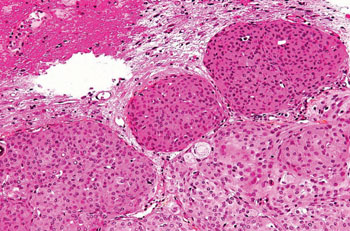High Blood Sugar Associated with Lower Risk of Benign Tumors
By LabMedica International staff writers
Posted on 07 Jul 2016
Meningioma, is a primary tumor arising from the membrane surrounding the brain and spinal cord, accounts for more than one-third of all primary brain and central nervous system tumors.Posted on 07 Jul 2016
The discovery that benign brain tumors that have previously been tied to obesity and diabetes are less likely to emerge in those with high blood sugar and this could shed light on the development of meningiomas, that are usually not cancerous but that can require risky surgery and affect a patient's quality of life.

Image: A histopathology of a meningioma with brain invasion (WHO Grade II); the tumor (bottom/right of image) has the typical \"pushing border\" invasion into the cerebral cortex (Photo courtesy of Nephron).
Scientists at Ohio State University (Columbus, OH, USA) and their Swedish colleagues conducted a cohort study to evaluate the potential effects of obesity-related prediagnostic glucose, triglycerides and cholesterol on meningioma and of prediagnostic meningioma on these biomarkers. They identified 41,355 individuals in the Apolipoprotein MOrtality RISk cohort with values for these biomarkers within 15 years before meningioma diagnosis, death, migration or the end of follow-up.
Meningioma was diagnosed in 181 women and 115 men whose median follow-up time was seven years. Fasting serum glucose level was inversely related to meningioma among women, but not men. Women with the highest fasting blood sugar were less than half as likely as those with the lowest readings to develop a tumor. When they compared the less-reliable non-fasting sugar readings, those taken without a period of no food or drink that could influence the results, they found that both men and women with high blood sugar had a lower likelihood of meningioma diagnosis.
The authors concluded paradoxically, hyperglycemia is inversely associated with meningioma in women. This finding does not necessarily negate the positive role of obesity or diabetes in meningioma development; rather, it may indicate that their effects depend on the stage of development. Furthermore, the prediagnostic tumor may reduce serum cholesterol levels.
Judith Schwartzbaum, PhD, a professor and the lead author of the study, said, “It's so unexpected. Usually diabetes and high blood sugar raises the risk of cancer, and it's the opposite here. These tumors take years to develop, and an earlier diagnosis would certainly lead to better surgical outcomes. It's also possible that sugar levels dip during early tumor development because the tumor is using glucose to grow.” The study was published on June 2, 2016, in the British Journal of Cancer.
Related Links:
Ohio State University













